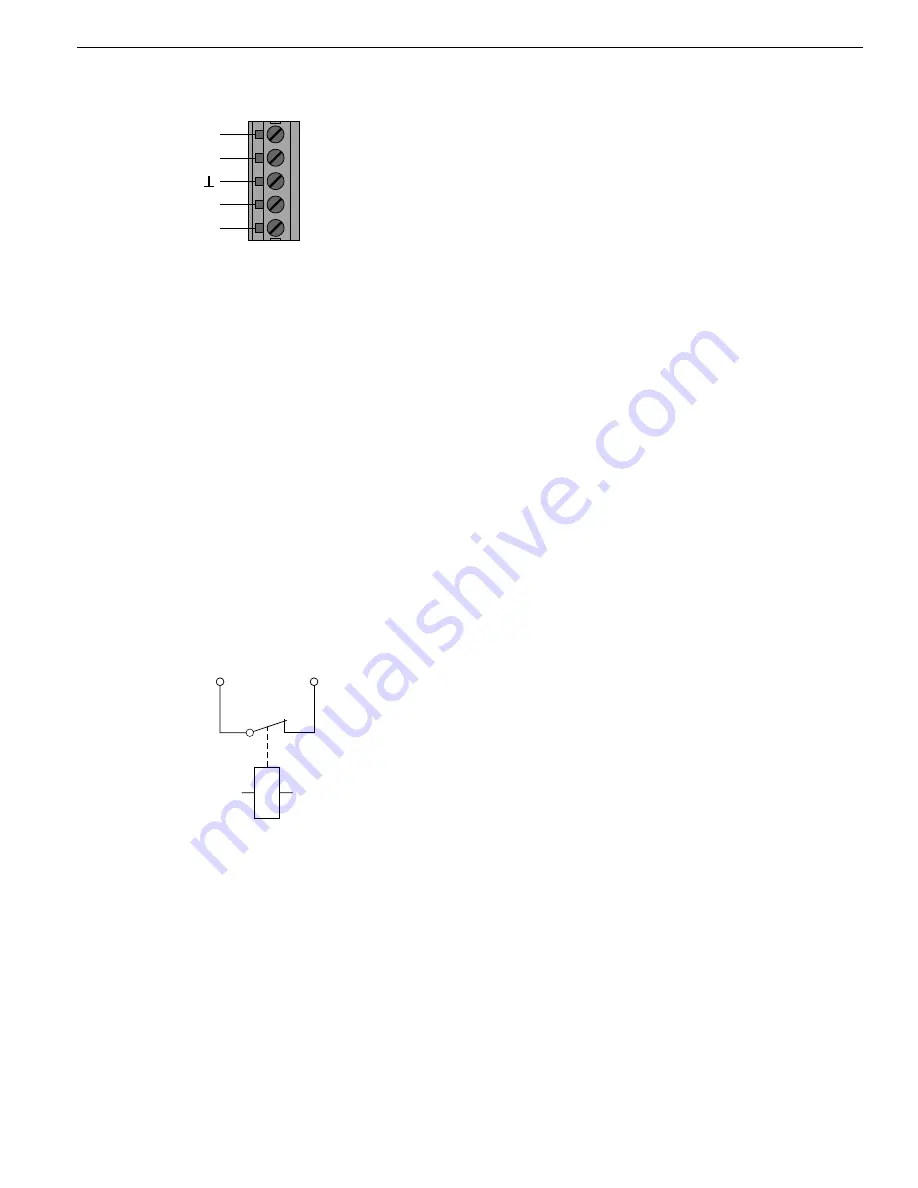
23
Version 1.0 8/00
4 Setting Up
4.4 Installation
Fig. 10: Operating voltage supply – assignment of 5-pin terminal
block
Fig. 11: Signaling contact - relay with unconnected contacts;
the contact is open if a fault occurs
4.4.4 Connecting the power supply
The terminal block can be removed from the device to
connect the lines.
The module should only be supplied with a regulated
safety extra-low voltage
in accordance with
IEC 950/EN 60 950/VDE 0805 with a maximum of
+32 V (t24 V). The power source must comply
with the regulations of the NEC, Class 2 in accordance
with UL/CSA approval.
It can be fed in using the 5-pin terminal block on the top
of the module.
To increase operational safety, the module can be
redundantly supplied via the terminals L2+/+24 V*
and M/
m
.
In the event of a failure of the regular power supply, the
module switches automatically to the redundant power
supply. Load distribution between the individual alter-
native supply sources does not take place.
The signaling contact does not signal the failure of a
single 24 V infeed. Both of the infeeds and the signa-
ling contact must be connected to an input module for
monitoring to take place.
Clips on the terminal block ensure that it is securely
attached to the device, and simultaneously provide
polarity reversal protection.
4.4.5 Connecting the signaling contact lines
The terminal block can be removed from the device to
connect the lines.
A relay with unconnected contacts as signaling contacts
is fitted to the 5-pin terminal block on the top of the
module. This signals faults and interference in the network
and modules. The contact is open if a fault occurs. This
also signals a total loss of power at the module.
Refer to Chapter 5.1 ”LED indicators“ p. 25 for more
details about malfunctions which are signaled by the
signaling contact.
Signaling contact limit values:
– maximum switching voltage 60 V DC; 42 V AC
– maximum switching current 1.0 A
The voltage connected to the relay must be
regulated
safety extra-low voltage
in accordance with IEC
950/EN 60 950/ VDE 0805 and must comply with the
regulations of the NEC, Class 2 in accordance with
UL/CSA approval.
L1+ / +24 V
F1
M /
F2
L2+ / +24 V*
F1
F2
Summary of Contents for SIMATIC NET PROFIBUS
Page 10: ...Contents viii PROFIBUS Networks SIMATIC NET 6GK1970 5CA20 0AA1 Release 2 05 2000 ...
Page 11: ...PROFIBUS NETWORKS 1 ...
Page 26: ...PROFIBUS NETWORKS 1 16 PROFIBUS Networks SIMATIC NET 6GK1970 5CA20 0AA1 Release 2 05 2000 ...
Page 241: ...A 1 PROFIBUS Networks SIMATIC NET 6GK1970 5CA20 0AA1 Release 2 05 2000 Testing PROFIBUS A ...
Page 254: ...Testing PROFIBUS A 14 PROFIBUS Networks SIMATIC NET 6GK1970 5CA20 0AA1 Release 2 05 2000 ...
Page 288: ...Installing LAN Cables C 26 PROFIBUS Networks SIMATIC NET 6GK1970 5CA20 0AA1 Release 2 05 2000 ...
Page 325: ...F 1 PROFIBUS Networks SIMATIC NET 6GK1970 5CA20 0AA1 Release 2 05 2000 Dimension Drawings F ...
Page 338: ...Dimension Drawings F 14 PROFIBUS Networks SIMATIC NET 6GK1970 5CA20 0AA1 Release 2 05 2000 ...
Page 396: ...Infrared Link Modul ILM 6ZB530 3AC30 0BA1 54 Copyright by Siemens ...
Page 434: ......
Page 438: ...Contents ii PROFIBUS Optical Bus Terminal OBT C79000 G8976 C122 02 Contents ...
Page 450: ...Network Topology 4 4 PROFIBUS Optical Bus Terminal OBT C79000 G8976 C122 02 ...
Page 458: ...Installation and Startup 5 8 PROFIBUS Optical Bus Terminal OBT C79000 G8976 C122 02 ...
Page 460: ...Troubleshooting 6 2 PROFIBUS Optical Bus Terminal OBT C79000 G8976 C122 02 ...
Page 464: ...Technical Specifications 7 4 PROFIBUS Optical Bus Terminal OBT C79000 G8976 C122 02 ...
Page 468: ...References 9 2 PROFIBUS Optical Bus Terminal OBT C79000 G8976 C122 02 ...
Page 470: ...Abbreviations 10 2 PROFIBUS Optical Bus Terminal OBT C79000 G8976 C122 02 ...
Page 478: ...References I 4 PROFIBUS Networks SIMATIC NET 6GK1970 5CA20 0AA1 Release 2 05 2000 ...
Page 488: ...Glossary Glossary 8 PROFIBUS Networks SIMATIC NET 6GK1970 5CA20 0AA1 Release 2 05 2000 ...














































